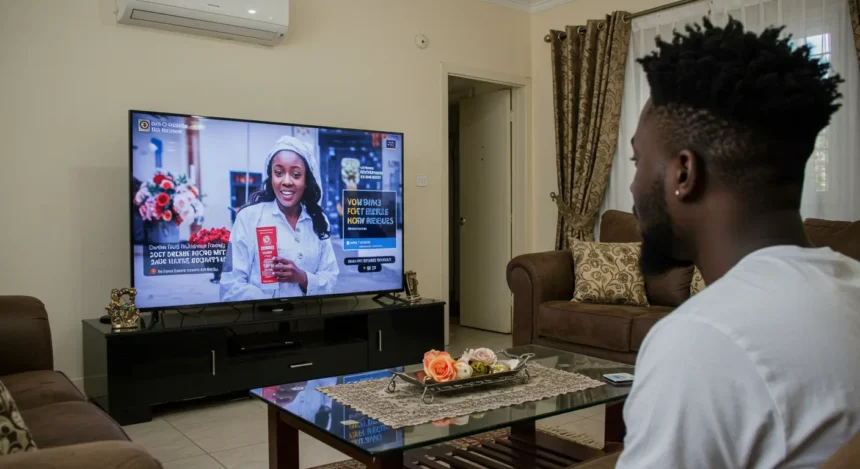There was a time when Nigerian households would pause to watch an MTN jingle or an Indomie cartoon ad. Today, if you ask 22-year-old Susan Nnamdi, a content writer and micro-entrepreneur, when last she paid attention to a TV commercial, she laughs: “The only time I see a TV ad is when my dad is watching SuperSport. And even then, I’m on my phone.”
Welcome to the post -TV era for Gen Z Nigerians. Born between the mid-1990s and 2012, this digital-native generation has grown up on streaming, skits, memes, and short-form content. Their attention is on YouTube, TikTok, Instagram Reels – not NTA or even cable TV.
So why is Gen Z tuning out of TV ads? And what does this mean for brands, advertisers, and the Nigerian economy? TV Ads? That’s Your Parents’ Stuff To Nigeria’s Gen Z, television advertising feels forced, inauthentic, and outdated. It’s not about the jingles being bad – it’s about relevance and control.
“TV ads are like one-way conversations. We want ads we can like, comment on, share, or skip if we’re not feeling it,” says Nora Okonkwo, 24, a UI/UX designer and brand influencer in Lagos. “Everything I know about a new brand now comes from Instagram or TikTok.”
For a generation raised on data bundles and content-on-demand, scheduled programming simply doesn’t fit their lifestyle.
Where Gen Z Is Really Watching Ads
Forget 60-second TV commercials. Gen Z is more influenced by:
- TikTok skits and trends
- Instagram Reels and influencer reviews
- YouTube unboxings and how-tos
- WhatsApp status product teasers
- Snapchat and Twitter for real-time banter
According to a 2024 Statista report, over 63% of Nigerians between 18 and 30 consume video content more on TikTok and YouTube than on traditional broadcast channels. And over 70% trust peer influencers and creators more than corporate ads.
“An influencer I trust showing me how a hair wax product works in real time? That’s gold,” says Kamsi, who runs a side hustle curating TikTok reviews for local beauty brands. For Gen Z, the new ‘prime time’ is whenever their data is on. Ads now travel in the form of content – memes, skits, real reviews. It’s not the length of the ad, it’s the vibe said a digital track expert resident in Abuja.
The Rise of Influencer Commerce and Micro-Ad Platforms
Gen Z doesn’t like being sold to – they like being inspired. That’s why influencer marketing, user-generated content, and short-form branded storytelling are outperforming traditional TV spend. Take the success of Deyemi The Actor, who partnered with a fintech brand using a comic Instagram reel about saving and dating. Or Taaooma’s skits, which sneak in brand plugs while delivering comedy.
In the ₦5K to ₦100K ad range, Gen Z-owned businesses are paying nano and micro influencers with 2K–50K followers to create “real talk” promotions.
Implications: What This Means for Nigerian Businesses and the Economy
- Legacy TV Media Is Losing Advertising Revenue
As Gen Z’s trust shifts from traditional TV to digital channels, big brands are rethinking ad budgets. A 2025 PWC Nigeria Media Report reveals that TV ad spends dropped by 18% year-on-year, while digital ad spends grew by over 40%, led by mobile-first campaigns. - SMEs Are Winning the Digital Game
Smaller brands, with limited budgets, are leveraging this shift to challenge bigger players. By mastering Instagram, WhatsApp, and TikTok, these SMEs are bypassing expensive TV slots and directly converting followers to customers. - Job Creation in the Creator Economy
From video editors to TikTok influencers, copywriters to meme designers – an entire digital ad ecosystem is forming, driven by Gen Z. Nigeria’s digital creator economy could inject ₦100 billion annually, according to a recent estimate by the Nigerian Communications & Tech Development Initiative (NCTDI). - Content Becomes the New Currency
Gen Z’s shift also demands that brands become entertainers, educators, and storytellers – not just advertisers. This is pushing demand for branded content studios, AI-driven ad testing tools, and creator partnerships.
What Brands Should Do: Gen Z Marketing Survival Tips
- Go Native: Make ads look like the content your audience already enjoys.
- Use Storytelling: Share customer journeys, behind-the-scenes, or ‘a day in the life’ format.
- Micro-Influencers Over Celebs: Gen Z trusts relatability, not reach.
- Always Be Authentic: They can smell fake from a kilometer away.
- Engage, Don’t Interrupt: Comment sections are now more important than call-to-actions.
TV won’t die. It will evolve. It may become more event-driven (sports, politics, big news), but for brand building? Gen Z has already moved on.
As George Ugbegua, CEO, Dashboard Innovations (a leading Nigerian digital marketing agency), would put it, for this generation, attention is the new currency, and it’s not sitting on the couch watching NTA or Africa Magic. It’s on the mobile, on demand, and on their terms, in their own interest. Brands that follow them there not with a bullhorn, but with a good story, will win.







